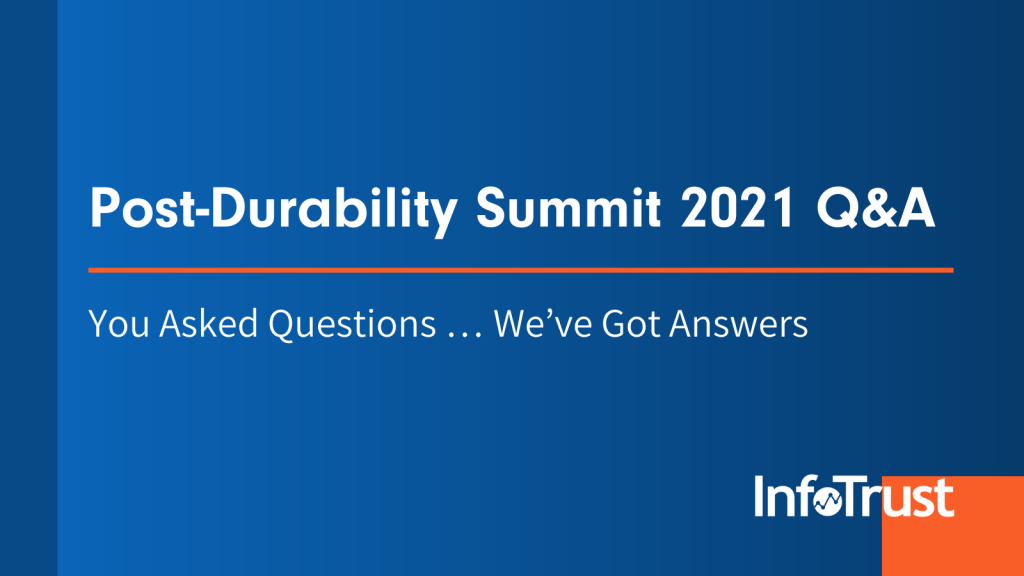InfoTrust recently hosted a Durability Summit, focusing on one of the largest changes the industry has seen in decades: major shifts in the realm of data privacy. Marketers, advertisers, platforms, and solutions must take a step back and consider what should be done instead of jumping from one solution to another. Over the course of this half-day summit, InfoTrust and Google explained how organizations can use testing to create a measured, successful, and durable response amidst the chaos of the changing marketing landscape.
While many questions were answered, there were still a few that weren’t able to be addressed live. Today, we’re following up to ensure you have what you need.
Session: Being a Privacy-Centric Advertiser in an Acronym-Heavy World (CCPA, GDPR, ITP, FLoC, and More!) (Watch)
Q: Are there any checklists that we can use to help focus on “what”?
A: We have several checklists that are worth checking out.
– Data Governance checklist
– General compliance checklist
– Comprehensive GDPR checklist
– GDPR compliance checklist
For more information about the CCPA, take a look at this webinar for marketing and advertising professionals and this article for steps an organization should take to prepare for the CCPA.
Session: How to Think about Your Activation Strategy in 2021 and Beyond (Watch)
Q: What are the current thresholds for audience size and spend for customer match per cid?
A: Google changes their customer match policies at times. For the latest updates, please reference their Customer Match Policy.
Session: Living in a Post-Third-Party World: What Data Should You Be Collecting Now and What You Can Be Doing With It (Watch)
Q: Any suggestions for how a small business can foster an experimentation culture when their resources are so limited?
A: First, as Maritsa described, there is much more to experimentation than running A/B tests on your website or app. It starts with recognizing when we’re making assumptions and having a willingness to validate those assumptions (and change them, when necessary). For example, you may have team members who have strong beliefs about which channels or campaigns work best. With a culture of experimentation, you could start to ask targeted questions about what being the best means and the conditions in which those channels/campaigns are best. Then, you could try the campaigns with different forms of measurement or under various scenarios to see if they still are the best. Regardless of whether the test led to a statistically significant result, you’ve increased your knowledge of how your marketing campaigns perform in the real world, which will help your future campaigns.
Second, to build confidence when you pitch testing efforts, it’s necessary to have solid data collection in place so that you can show that your testing recommendations are data-driven. At the heart of every test is a cause-and-effect relationship that you believe exists; to be able to test a possible solution, you need to have a strong basis for what happened and a hypothesis for why it happened (which come from your analysis of the existing data).
Finally, we use an approach called the PIE (Potential, Importance, Ease) method for helping teams prioritize tests. For a small team, prioritization is even more important because resources are limited. We’d suggest identifying the areas of your marketing where you can make the biggest impact/need the most help (i.e. potential) and ranking them by how important they are to your business and how easy they are to test. By standing up a process for testing, prioritizing and running tests, sharing results, and implementing improvements, you’ll start to build confidence that testing is valuable for the organization.
Q: When a user doesn’t give cookie consent, can we still get his/her behavioral data?
A: Using new methods like Consent Mode, you are able to collect interaction data without the tags setting or accessing cookies. So, yes—for Google tags, you can.
Didn’t See an Answer to Your Question?
That’s because your question is right at the heart of the uncertainty that each of us, and the industry as a whole, is feeling. The short answer: one magic-bullet answer does not exist today. However, the ideas and findings from these sessions highlight the importance of being durable as the answers are uncovered. Remain resilient in your efforts to adapt as the industry transitions through this great reset.
With any new piece of technology, there comes a period of testing and understanding. With so much unknown in this new cookieless world, things will vary from one business to another. Our best advice? Being testing to understand what the impact could be to your specific company, business, brand, or website. And don’t forget durability—privacy should be a priority no matter what.
Did You Miss the Live Durability Summit Event?
Don’t worry … we’ve got you covered!
Intro and Keynote: The Importance of Durability in Your Marketing Stack Strategy
Being a Privacy-Centric Advertiser in an Acronym-Heavy World (CCPA, GDPR, ITP, FLoC, and More!)
How to Think about Your Activation Strategy in 2021 and Beyond
What Marketing and Analytics Leaders Need to Know Google Analytics 4


